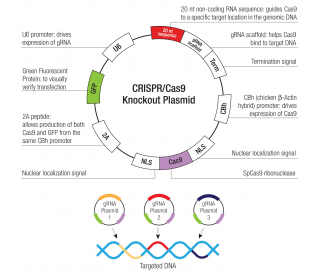Purity
>95%, by SDS-PAGE visualized with Silver Staining and quantitative densitometry by Coomassie® Blue Staining.
Endotoxin Level
<0.10 EU per 1 μg of the protein by the LAL method.
Activity
Measured by its binding ability in a functional ELISA. When Recombinant Mouse R‑Spondin 3 (Catalog # ) is coated at 0.25 μg/mL, Recombinant Mouse RNF43 Fc Chimera binds with an ED 50 = 0.8-4.8 ng/mL.
Source
Mouse myeloma cell line, NS0-derived
Mouse RNF43
(Ala34-Tyr197)
Accession # Q5NCP0IEGRMDP Mouse IgG2a
(Glu98-Lys330)N-terminus C-terminus N-terminal Sequence
AnalysisAla34 & Val36
Structure / Form
Disulfide-linked homodimer
Predicted Molecular Mass
45 kDa
SDS-PAGE
53-63 kDa, reducing conditions
8890-RN |
| |
Formulation Lyophilized from a 0.2 μm filtered solution in PBS. | ||
Reconstitution Reconstitute at 100 μg/mL in PBS. | ||
Shipping The product is shipped at ambient temperature. Upon receipt, store it immediately at the temperature recommended below. | ||
Stability & Storage: Use a manual defrost freezer and avoid repeated freeze-thaw cycles.
|
Background: RNF43
RING finger protein 43 (RNF43) is a 90 kDa member of the ZNRF3 family of ubiquitin ligase proteins (1, 2). Mouse RNF43 is synthesized as a 784 amino acid (aa) protein that contains a putative 23 aa signal sequence, a 174 aa extracellular domain (ECD), a transmembrane domain, and a cytoplasmic domain with an atypical RING-type zinc finger (1). RNF43 is expressed in stem cells at the bottom of colon crypts, where it limits the ability of Wnts to induce proliferation (3). RNF43 and ZNRF3, another transmembrane E3 ubiquitin ligase, ubiquitinate and promote the turnover of Frizzled Wnt receptors to antagonize Wnt signaling (3, 4). RNF43 has been shown to suppress both canonical and non-canonical Wnt signaling pathways by distinct mechanisms (5). RNF43/ZNRF3-mediated turnover of Frizzled receptors is inhibited by R-Spondin (4). Dishevelled, a positive regulator of Wnt signaling, interacts with RNF43/ZNRF3 to mediate turnover of Frizzled receptors (6). RNF43 may promote cell survival by binding to NEDL1 and by suppressing the transcriptional activity of p53 (7, 8). RNF43 has been shown both to inhibit and promote cancer. Deletion of RNF43, as well as mutations found in colorectal and other cancers, allows hypersensitivity to Wnts and promotes adenoma formation (3, 9). Furthermore, RNF43 down-regulation in gliomas is associated with poor prognosis (10). However, RNF43 is frequently over-expressed in cancers, correlating with growth-promoting activity and colorectal and hepatocellular cancer pathogenesis (1, 7, 11).
References:
Yagyu, R. et al. (2004) Int. J. Oncol. 25:1343.
de Lau, W. et al. (2014) Genes Dev. 28:305.
Koo, B.K. et al. (2012) Nature 488:665.
Hao, H.X. et al. (2012) Nature 485:195.
Tsukiyama, T. et al. (2015) Mol. Cell. Biol. 35:2007.
Jiang, X. et al. (2015) Mol. Cell 58:522.
Xing, C. et al. (2013) Mol. Cancer Ther. 12:94.
Shinada, K. et al. (2011) Biochem. Biophys. Res. Commun. 404:143.
Giannakis, M. et al. (2014) Nat. Genet. 46:1264.
Xi, S. et al. (2015) Int. J. Clin. Exp. Pathol. 8:490.
Uchida, N. et al. (2004) Clin. Cancer Res. 10:8577.
Long Name:
Ring Finger Protein 43
Entrez Gene IDs:
54894 (Human); 207742 (Mouse); 303412 (Rat)
Alternate Names:
DKFZp781H02126; DKFZp781H0392; FLJ20315; FLJ77466; FLJ99338; MGC125630; ring finger protein 43; RNF124; RNF43; URCC










